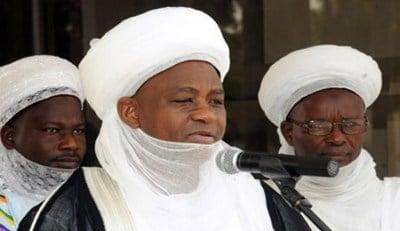The Sultan of Sokoto, Alhaji Muhammad Sa’ad Abubakar, has highlighted the adverse impact of insecurity and other factors on the immunisation of children in Northern Nigeria.
On Wednesday, the Sultan chaired a strategic meeting in Kaduna with traditional leaders and development partners. The meeting, organised by the National Primary Health Care Development Agency (NPHCDA) in collaboration with the Sultan Foundation for Peace and Development, aimed to address the challenges faced by northern children in accessing immunisation services.
In attendance were representatives from the United Children Trust Fund (UNICEF), the World Health Organisation (WHO), Kaduna State Deputy Governor Hadiza Sabuwa Balarabe, and other stakeholders.
The Sultan emphasized the commitment of the traditional institution in ensuring that communities benefit from routine immunisation. He stated that the meeting aimed to engage with traditional leaders to reach out to completely inaccessible and displaced communities in Kaduna, Niger, and Katsina states, thereby ensuring that every child in the north receives immunisation.
“We do not lack support from our people; what we lack is implementation, and that is why the north is lagging behind in immunisation,” the Sultan explained.
Alhaji Sama’ila Muhammad Mere, the Emir of Argungu and Chairman of the Northern Traditional Leaders Committee on Primary Health Care, emphasized the urgent need for the meeting, following a situation report received during the first quarter NTLC review meeting from Zamfara.
The report from Zamfara highlighted the devastating security situation in the state, making it difficult or impossible to access many communities and provide healthcare services to children. This creates a high risk of Vaccine-Preventable Diseases, particularly the mutated vaccine-derived polio virus.
Zamfara currently carries the highest burden of this disease in the country, and the strain of the virus from the state has been found in 28 states across Nigeria and 29 countries in Africa. The meeting acknowledged similar security challenges in Sokoto, Kebbi, Katsina, Kaduna, and Niger states.
The meeting aimed to gather situation reports and mitigation suggestions from 48 districts in 34 LGAs across Kaduna, Niger, and Katsina states. The district heads were encouraged to provide honest assessments of the situation in their respective areas and propose ways in which the government and development partners can collaborate to ensure vaccination and comprehensive medical support for every child and mother.
Faisal Shuaib, the Executive Director of NPHCDA, expressed gratitude to the traditional rulers for their invaluable support in eradicating the circulating variant polio virus (cVPV2) from their communities. He believed that their influence has the power to shape the destiny of communities and requested their partnership to secure a healthier and brighter future for immunised children in the north.
Shuaib stressed that the battle against cVPV2 requires a united front, calling for collaboration between traditional, religious, and local leaders, healthcare workers, parents, and every citizen who aspires for a polio-free future.
Dr. Walter Kazadi Mulombo, the WHO Country Representative to Nigeria, announced that the country recorded 51 polio cases between January and August 13, 2023, in 15 LGAs, as reported by the WHO. He noted that 47 of these cases (92%) were concentrated in the North West region, with a 63% decrease in the circulating variant poliovirus type 2 (cVPV2) compared to 2022.
Mulombo highlighted that cases were predominantly concentrated in states facing security challenges, particularly in Kaduna state, where 19 LGAs and 111 wards have insecure settlements, posing a risk to progress.
